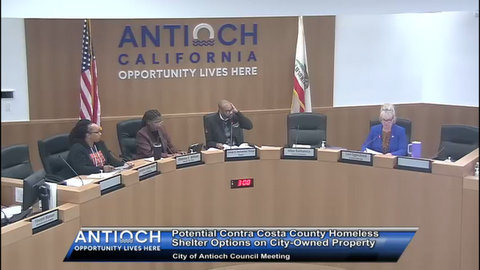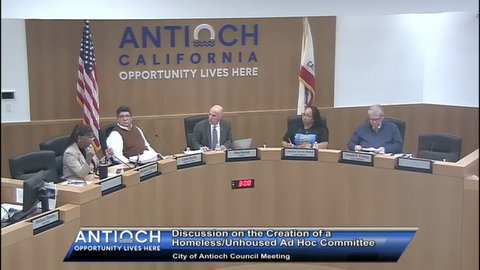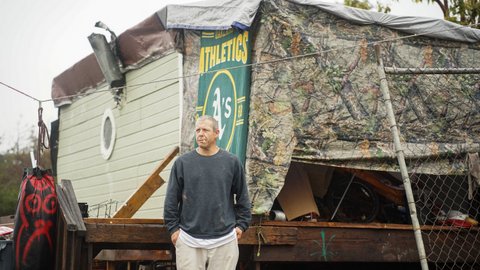
27 Nov Antioch Moves to Create CORE Team, but Unhoused, Advocates Call It a ‘Waste of Money’

(Screenshot captured by Samantha Kennedy / The CC Pulse)
By Samantha Kennedy
Some homeless Antioch residents are one step closer to receiving support from a full-time city-funded homeless outreach team in 2025 — but how much it’ll help is up for debate.
The Antioch City Council on Tuesday allocated $75,000 — half of what’s required to establish a Coordinated Outreach and Referral Engagement, or CORE, team — to create a city-dedicated team that hopes to address service gaps for homeless residents.
“If we don’t get a CORE Team, we’re going to continue to complain about the lack of services,” council member Tamisha Torres-Walker said.
If implemented, Antioch’s CORE Team would provide outreach and engagement to around 40 homeless residents at the encampment near Sunset Drive and Devpar Court. The team will collaborate with the Antioch Police Department and the Angelo Quinto Community Response Team to conduct welfare checks.
Funding, half of which comes from the Encampment Resolution Funding, currently only allows the CORE Team to serve residents at that encampment because of funding guidelines, according to a report from the city.
Since 2023, Antioch’s homeless population has increased by 23%, according to the 2024 Point in Time Count, making it the city with the most unhoused residents in Contra Costa County.
Contra Costa’s CORE Team provides Antioch with some services, including pathways to permanent housing and basic needs support, but the city says “limited resources” in the city leave homeless residents to venture to Walnut Creek or Richmond for help.
Nancy, an unhoused Antioch resident, said CORE’s assistance does not do as much as it should. For her, that assistance has been a blanket, some water, a snack bag and suggestions to call 211, which is a 24/7 social services and health information line managed by the Contra Costa Crisis Center.
“It’s to the point where the woman that answers the phone, all I have to do is give her my birthdate, and she says, ‘Hey, Nancy, what are you doing?’” Nancy told the council. “They’re not doing anything, and I think it’s a waste of money for you to want a CORE Team.”
The problem, she says, is the lack of shelter beds available to homeless residents, especially in East County.
Between Jan. 1 and Nov. 17 of this year, CORE made nearly 1,700 unduplicated contacts with homeless Antioch residents, according to data from the city. Over 100 were placed in a long-term shelter and another more than 100 were placed into housing with some type of subsidy.
Even with some success, “the absence of a dedicated City-funded team in Antioch limits its ability to address homelessness locally and comprehensively,” according to a staff report.
Other cities, including a recent collaboration between El Cerrito, San Pablo and Contra Costa County, have also helped fund expanded CORE services to homeless residents in their area.
Nichole Gardner, founder of Facing Homelessness in Antioch, recognizes the importance of local support when addressing homelessness, but also felt the funding could be put to better use elsewhere.
“As an advocate, I’ve been out there, the encampments,” said Gardner. “CORE, when they do come, it’s a bag of snacks or hygiene (products)…I just really don’t see how putting this money into a CORE team will do anything.”
Gardner says it isn’t CORE’s fault, saying team members have told her that they’re overwhelmed and they’re aware of the lack of shelter beds.
Other residents agreed with Gardner, suggesting funding go towards something like the Angelo Quinto Community Response Team, which offers 24/7 response by staff trained in mental health support to non-life-threatening 911 calls, or toward buying a building to provide housing.
Mayor Lamar Hernandez-Thorpe reminded residents that the funding, which matches a $75,000 portion from a $6.8 million Encampment Resolution Funding that Antioch received at the beginning of October, is required to meet the city’s obligation with the grant.
Hernandez-Thorpe, who called for a stricter ordinance regulating encampments following a U.S. Supreme Court ruling allowing bans on public sleeping and Gov. Gavin Newsom’s threats to withhold funding for failing to clear encampments, has spoken about the need for additional shelter in East County.
He and Torres-Walker said that should be taken up with the Board of Supervisors.
“Go to these people,” Torres-Walker told residents, “because they owe us resources and representation.”
The allocations only help fund the CORE Team through June 30, 2025, so additional funding for the following year would have to be allocated at a future budget meeting.
That decision would not be made by the current progressive majority council following the results of the Nov. 5 election, leaving Mayor-elect Ron Bernal and incoming council members Louie Rocha and Don Freitas to work alongside Wilson and Torres-Walker.
Bernal made homelessness a top priority during his campaign, calling the situation in Antioch “a crisis” that he wants to address by expanding mental health and substance abuse services, building housing, and partnering with community organizations.
The allocation passed in a 4-0 vote, with council member Michael Barbanica absent.
The next Antioch City Council is Dec. 10.






No Comments